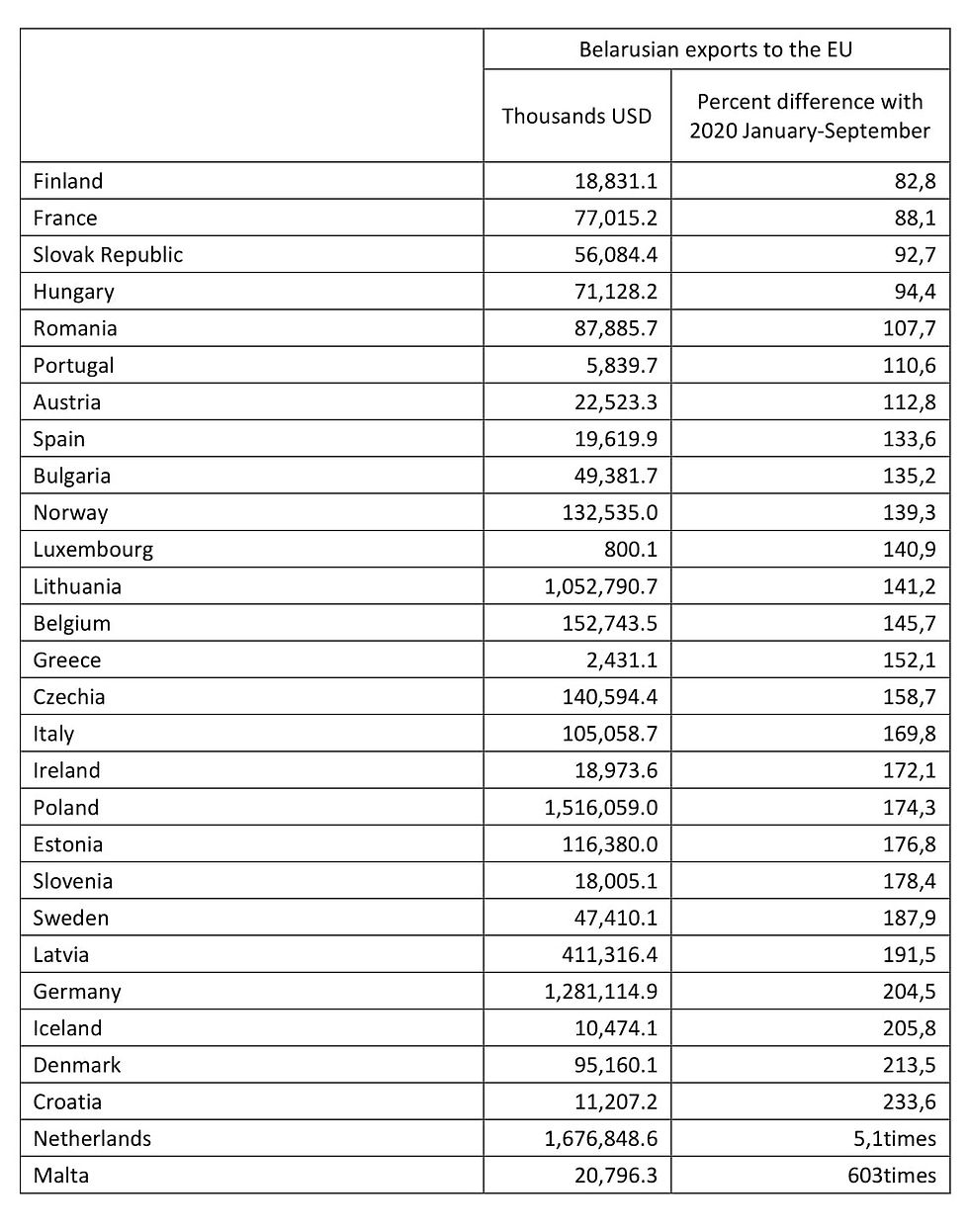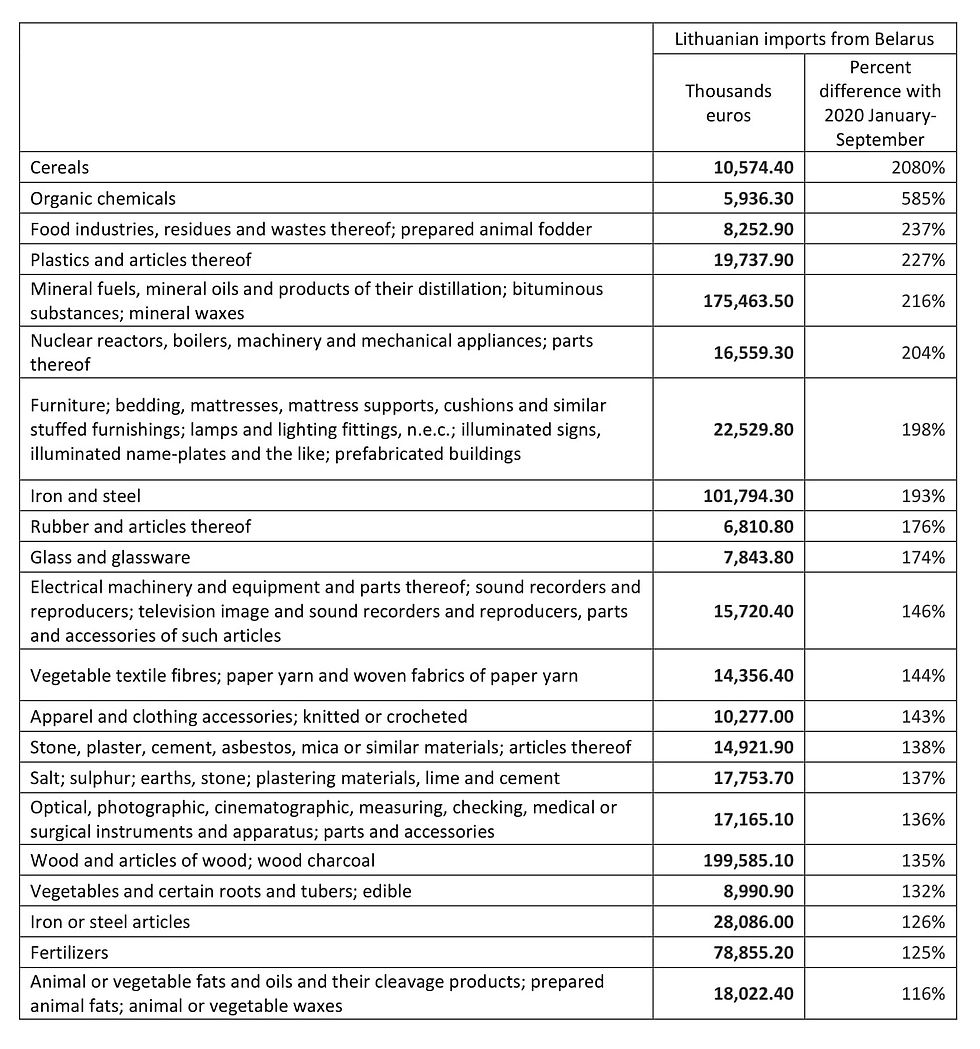2021 - the golden year of Belarusian exports?
- Dec 6, 2021
- 3 min read
While the whole world is watching the migrant crisis on the Belarusian-EU border, the Lukashenko regime is going through the golden age of exports that many countries could envy. It turns out that the serious concern about the illegality of the regime and the inhumane treatment with migrants is not an obstacle for deeper business development. The article was prepared for publication by volunteers of the Res Publica – Civic Resilience Center.

"Exports to the European Union have almost doubled, rescuing the economy from recession and helping keep Lukashenko afloat" Bloomberg says. According to Belstat, Belarus's official statistics agency, Belarus's exports to the European Union in the first three quarters of this year were 96.1% higher in comparison with the same period last year, and Belarus's total exports were as much as 36.1% higher than in 2020. For comparison, Lithuania's total exports grew by 24% over the same period, and to the European Union by 20% only.
Overall, almost all EU countries (except 4) increased their imports from Belarus. E.g. The Netherlands imported 5.1 times more from Belarus than in 2020 and has become Belarus' largest export partner to the EU. Congratulations to the Netherlands.

Source: https://www.belstat.gov.by
The EU statistical agency, Eurostat, does not yet have a complete set of comparable data. However, according to interim data, imports from Belarus to the EU-27 increased by 58% by August compared to the same period in 2020. Basically, the data are very similar. Differences are possible due to different calculation methodologies, but this does not change the substance. For example, according to Belstat, Belarusian exports to Lithuania grew by 41%, while the Department of Statistics of Lithuania indicates a 48% increase.

Source: https://www.bloomberg.com
While other economies in the region are also recovering from the recession of the COVID-19 pandemic in 2020, Belarus's recovery is larger than expected. After last year’s political turmoil, economists, including the World Bank, predicted a deep recession for the country. However, the exact opposite seems to have happened.
Belarus has benefited enormously from global demand and price rise followed by production disruptions in Asia. Timber and metals, traditionally largest share of Belarus' exports to the EU, are also currently in high demand. Belarus has also benefited well from the supply chain disruptions that have lowered competition from Asia and increased demand for Belarusian products, including furniture and machinery. It didn’t hurt that the International Monetary Fund decided in August to give Belarus its almost $1 billion share of a special distribution, propping up the nation’s foreign currency reserves.
The U.S. and EU sanctions only took effect in June and were less punitive than billed. For example, sanctions on EU imports of potash from Belarus have been applied in such a way that they do not affect the main types of potash products produced. Most of Belaruskalij's exported potassium chloride has a potassium content evaluated as K2O of 60% by weight in the dry anhydrous product while sanctioned potassium chloride should content more than 62%. And that’s probably not a coincidence. According to the Bloomberg, in negotiations around further sanctions, Belgium and Italy are blocking any expansion on potash, as well as petroleum measures. The focus is on grounding Belarus’s national airline, Belavia, already blocked from the EU, and pressuring other airlines to stop carrying migrants to Minsk from the Middle East. Meanwhile Belarus remains the world's third largest supplier of potassium after Canada and Russia.
Time will show whether this boost of Belarusian exports will last for long. Some analysts say the full impact of the sanctions will be visible only next year. The Center for the Eastern Studies (OSW) in Poland, for example, says that this year situation is just a temporary recovery before the inevitable recession. We will see.
Belarusian exports to Lithuania
According to the Department of Statistics of Lithuania, Lithuanian business within the first three quarters of 2021 imported from Belarus as much as 48% more in comparison with the same period in 2020. Table below shows groups of products with the highest weight (over 5 million euro) which imports from Belarus to Lithuania increased.

Source: https://osp.stat.gov.lt
Sources:





Comments